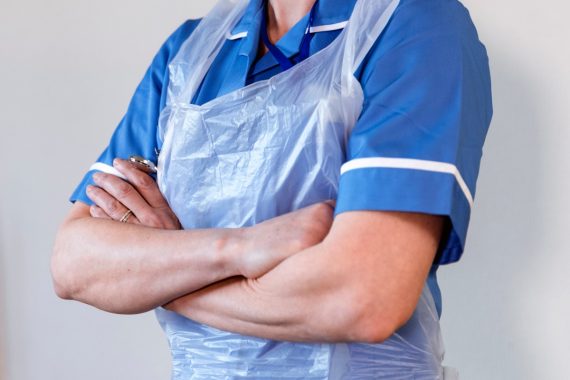GPs told to wear PPE when dealing with suspected measles

GPs and practice staff should wear PPE when dealing with suspected measles to stop transmission, according to new NHS guidance.
The UK Health Security Agency has this week declared a national incident based on rising cases of measles and outbreaks in the West Midlands and Yorkshire.
In response, NHS England is launching a catch-up campaign for children aged six to 11 who still require the MMR vaccine, and told practices to prepare for an increase in enquiries.
On Wednesday, NHSE also published new guidance on infection control measures and risk assessment for measles in healthcare settings, including general practice.
It advised GP teams that if patients with suspected measles require an in-person review, they should be separated from other patients and isolated on arrival at the practice.
Since GP practices are ‘most likely’ to be a first contact for these patients, the guidance said reception staff should be aware of the symptoms.
‘Staff should know that any patients with fever and rash are potentially infectious and take appropriate action to stop onward transmission without delay, including PPE,’ it added.
NHS England said that if ‘vulnerable individuals’, including unvaccinated patients and pregnant women, are exposed to suspected or confirmed measles, GP practice teams should undertake a risk assessment ‘to urgently consider need for post-exposure prophylaxis’.
According to the guidance, any healthcare worker who has face-to-face contact of any length or spends more than 15 minutes in a confined area with a confirmed measles patient is considered to be ‘exposed’, unless they are wearing appropriate PPE.
Those staff members who are exposed and do not have two ‘documented doses’ of a measles vaccination should be ‘excluded’ from work from the fifth day after their first exposure to 21 days after the final exposure.
Guidance on PPE
Staff should wear the following PPE when assessing or managing patients with confirmed or suspected measles:
- single-use, disposable gloves
- single-use, disposable apron (or gown if extensive splashing or spraying, or performing an aerosol generating procedure (AGP))
- respiratory protective equipment (RPE)
- eye/face protection (goggles or visor)
Source: NHS England
UKHSA chief executive Professor Dame Jenny Harries has warned there is a ‘very real risk’ of the virus spreading in other towns and cities, beyond the outbreak in Birmingham, due to low vaccine uptake in some communities.
In November, NHS England asked GPs to participate in a catch-up campaign for the MMR vaccine after public health officials warned of rising cases of measles – this is a requirement as part of the GP contract.
Declaration of a ‘national incident’ allows the UKHSA to ‘focus on limiting further spread of the outbreak including additional work to help protect other areas at greatest risk’.
But Pulse understands there are no further plans to incentivise GP practices to boost MMR vaccination amid the outbreaks.
NHS England will soon expand its national vaccination invitation scheme, inviting around one million children aged six to 11 who are missing their first or second MMR vaccination throughout February and March.
The scheme will be expanded further in the Midlands and London, where cases are high, to include around 1.2 million children and young adults aged 11 to 25.
The national commissioner told GPs in its recent primary care bulletin: ‘Practices should prepare to receive enquiries from their registered patients during February and March 2024 who have received a national MMR vaccination reminder, and should check immunisation records, book, and administer vaccination, if clinically appropriate.’
The agency’s annual figures showed that in England MMR vaccine uptake for first and second doses by five years has fallen to the lowest rates since 2010/11.
And no vaccines met the World Health Organisation (WHO) 96% uptake target in England.
Pulse July survey
Take our July 2025 survey to potentially win £1.000 worth of tokens

Visit Pulse Reference for details on 140 symptoms, including easily searchable symptoms and categories, offering you a free platform to check symptoms and receive potential diagnoses during consultations.
Related Articles
READERS' COMMENTS [6]
Please note, only GPs are permitted to add comments to articles












Given that GPs of a certain vintage have been dealing with measles intermittently without PPE in the past, where is the evidence that PPE is effective? Given that the flimsy aprons and pathetic paper masks we are issued with were a chocolate fireguard during Covid, how did they come to this conclusion? Or is it perhaps simply giving the illusion that NHSE are “doing something to protect patients and staff” when in fact there is precious little we can actually do to stop this virus spreading?
Where I we to get visors from? Or is this another cost to be absorbed every time we see someone with a rash
Many NHS roles serve no useful purpose; but to conceal this and justify their salaries, those employed in such roles often resort to activities that obstruct and hinder those actually engaged in useful work. PCNs are full of such people.
This is a classic example of the phenomenon.
So, any child (or adults too?) with a rash, or cough, or fever, or just mildly ‘off-it’, we need to dress up again? Even though we all had compulsory vaccination against MMR at Medical School?
Daryl – the visors are still in the cupboard at the local ICP team, who wold not let you have them for Covid !
“But Pulse understands there are no further plans to incentivise GP practices to boost MMR vaccination amid the outbreaks”
All vaccination programmes are the responsibility of (NHS) “Public Health” departments” and having children vaccinated is is a parental responsibility. It is not a responsibility of individual GPs or of their combined Practices.
I had Measles, aged 7 or so and was one of the lucky 98% to get over it without major issues. Seeing a case wouldn’t bother me in the slightest.